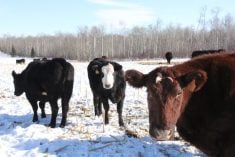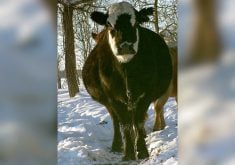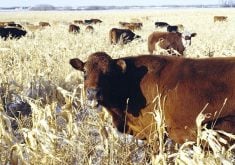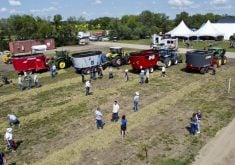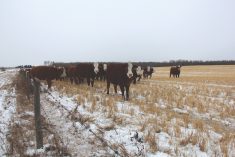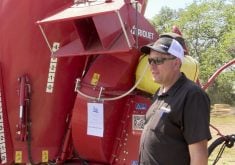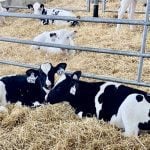The Bouw household likely isn’t found standing still very often. With four children, Bouw Farms Ltd. and Edie Creek Angus, Stefan and his wife Kendra are on the move. Stationed just east of Winnipeg, near Anola, Man., Bouw works alongside his brother, Jonathan, and father, Herman, on the operation founded by their immigrant grandparents in the late 1950s. Though many things have changed since the inception of the ranch, the Bouw family continues to grow and thrive with a vision for the future.
Initially, the ranch began as a feedlot, with a small cow herd. However, the tough times that BSE brought in the early 2000s forced the family to pivot. Thus began their focus on cow-calf production, and more so, their notable purebred herd. Bouw’s love of black cattle was sparked at a young age. Like many young ranchers, a 4-H heifer was the starting point for his Angus preference. At around the age of 10 or 11, he found himself enamoured with the breeding side of ranching, which ignited the drive to build a seed stock herd.
Following high school, Bouw completed a diploma in agriculture at the University of Manitoba. His eyes were opened to the importance of having a business-forward focus in agricultural operations — a sentiment he carried into his approach to the family farm. His desire to raise purebred Angus focused on low-input cattle raised in ranching conditions.
Read Also

Alberta ranch family outlasts droughts
Over the years, the Lehr family has learned a thing or two about managing the ranch through dry years
“It takes a 1,250-lb. cow to survive in our climate in Manitoba,” Bouw says. “But our goal is to keep them to be low input to keep costs down.”
Coming home from university, Bouw got straight to work, experimenting with the existing operation and working to find an effective connection between existing production practices and a balanced business focus. Bouw Farms has seen multiple agricultural endeavours over the years. From organic cropping to a 360-head sheep herd Bouw managed for a few years, he has never been afraid to try new things. Building an outstanding herd of purebred ranch-focused Angus cows has been a learning curve for the Bouw brothers. However, they have fully embraced every lesson. Focusing on maternal qualities and forage-developed genetics has allowed the Bouw family to present Edie Creek Angus as an outstanding producer in the Canadian Angus marketplace.

Bouw’s education in the beef industry didn’t end at university either. In the past few years, he has participated in both youth programs presented by the Canadian Cattle Association. Initially, Bouw stood for a two-year term with the Canadian Cattle Youth Council. In 2023 he also graduated from the Canadian Cattle Young Leaders Program. The mentorship program has influenced over 100 young beef industry leaders over the last 13 years, and Bouw is no exception.
Paired with Jerry Doan of Black Leg Ranching in North Dakota, Bouw focused his mentorship on the importance of fully understanding the cattle business. Doan’s operation is vast, including cow-calf, bison, custom grazing, a brewery, waterfowl hunting and a wedding venue. He instilled in Bouw the need to have a strong business structure beyond production practices.
“All cattle operations are diversified,” Bouw says. “We have a cattle enterprise, a land enterprise and a feed production enterprise. The key is creating a successful intersection of the three. When you keep something from one enterprise, you are ideally selling it to another.”
The young leaders program also allowed Bouw to take in the Ranching for Profit program in Grand Forks, North Dakota. “It was like a two-year diploma crammed into one week.”
The program helped Bouw gain a better perspective on what profitability looks like for his operation while offering benchmarking examples to compare with other operations.
Doan isn’t the only mentor who has had a lasting influence on Edie Creek Angus. Monte Howrey is another rancher who has helped shape the future of the Bouw family. Originally meeting in 2012, Howrey acted as another mentor to the Bouw brothers. Over the last 10 years, Bouw has become very familiar with the Howrey program. Though from different sides of the 49th parallel, Edie Creek and Howrey Angus share considerable similarities in their herds.
In 2022, spearheaded by Stefan, the Bouw brothers purchased the Howrey Angus herd, providing the family with an exciting opportunity to diversify their business. With the herd remaining in Sterling, South Dakota, and being managed by Kip Rath and his family, Edie Creek Angus can now target two different markets with two herds, sharing the qualities that Bouw believes in. Having a bull sale on either side of the border increases their marketing reach, mitigates risk and allows the family to expand their brand.
On the home front, the Bouw family has been experimenting with winter feeding protocols in the last few years. Bale grazing has been a popular form of winter feeding for the last decade. However, drought conditions in 2021 forced them to pivot due to expensive feed prices.
Enter corn grazing. The winter of 2022 was their first crack at the program, but the family found success. The calves remained at the cow’s side and were not weaned until early March, which carried twofold benefits. First, the calves were able to manage the weight of the cows, preventing them from becoming too heavy while grazing on the highly nutrient-dense feed. Second, it helped keep feed costs for the calves down over the winter.
By minimizing the diesel Edie Creek Angus burns over the winter, Bouw can reduce expenses. “The less equipment between the cow and the feed, the better,” says Bouw.
Silage pile grazing is another means of minimizing equipment use for winter feeding that the Bouws are employing this winter. By allowing the cow herd access to a covered silage pile in the field, Bouw hopes to avoid starting the tractor daily. As the cows clean up the exposed forage, more silage pile tarp will be rolled back, exposing more silage for further grazing.
Though family dynamics can pose significant challenges when mixed with business, the Bouw family works hard to remain connected in their approach to agriculture. Their “people first” mentality makes it all work. “Why?” has always been an easy question for Bouw to answer when it comes to ranching.
“It’s a rewarding lifestyle,” he says. “It’s a great way to raise my kids with confidence and a sense of purpose.”
Since immigrating from Holland to Canada in the 1950s, the Bouw family has shown resilience and the desire to build a legacy. Through his ability to adapt and think critically about the foundation of their business, Stefan Bouw is carrying on. Diversification, a business focus and strong family dynamics are creating opportunities for the next generation of potential ranchers.



